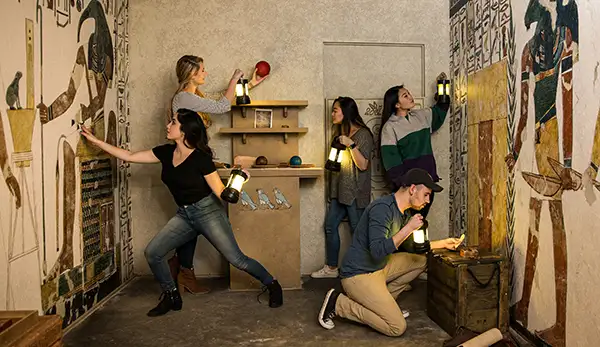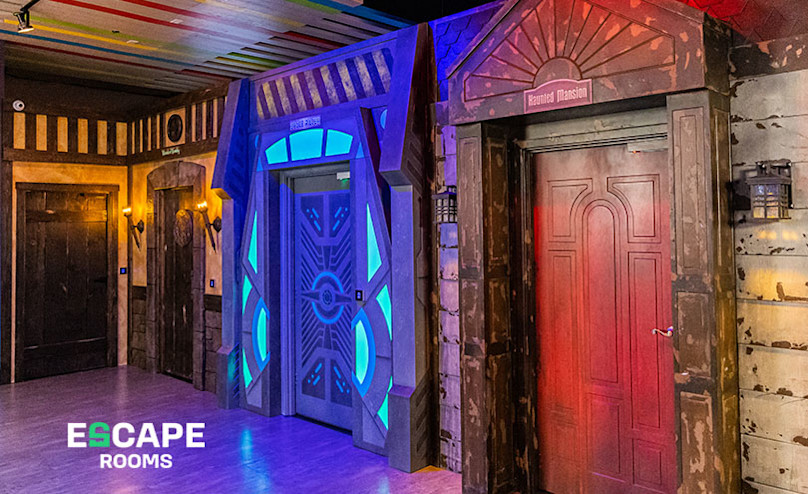Team Methods: Just How to Work together Effectively in an Escape Space
Navigating the complexities of a getaway room demands more than simple enthusiasm; it calls for a well-coordinated strategy grounded in clear communication, tactical function projects, and skilled time administration. Teams must actively listen to every participant's insights, appoint functions that align with private toughness, and keep routine check-ins to guarantee focus and protect against redundancy. By fostering an atmosphere that values cohesion and versatility, teams can considerably enhance their efficiency and success prices. The nuances of these techniques can transform the experience, however how precisely can they be carried out to take full advantage of the possibility for success?
Establish Clear Interaction

To facilitate clear interaction, it is necessary to designate a main factor of contact for info dissemination. This duty entails summarizing searchings for and suggested methods to make sure everyone continues to be on the exact same page. In addition, embracing an organized strategy to discussions can stop chaotic exchanges. Short, focused updates from each team member can maintain the team notified without overwhelming them with info - best escape room.
Designate Duties Tactically
While clear communication sets the structure for efficient synergy, designating duties purposefully makes certain that each staff member's toughness are used effectively. In an escape space scenario, the time-sensitive and intricate nature of obstacles demands a well-organized strategy to job delegation. By recognizing and leveraging individual expertises, groups can optimize their analytical capabilities and improve overall efficiency.
First, assess the special abilities and qualities of each participant. Someone with a keen eye for detail may stand out in locating covert objects, while a rational thinker might be much better fit to addressing puzzles. It's equally important to have a leader that can oversee progress, handle the timeline, and make definitive calls when required. This function frequently requires strong organizational and social abilities.
Second, make sure that duties are adaptable and versatile. As new difficulties emerge, the group must have the ability to pivot, reallocating jobs as required. This adaptability helps keep momentum and prevents traffic jams that can occur because of stiff role assignments.
Ultimately, a calculated technique to function assignment not only makes best use of the toughness of each group participant yet additionally cultivates a cohesive setting, driving the group in the direction of a successful retreat.
Utilize Diverse Abilities
Identifying and using the diverse abilities within your team can substantially elevate your efficiency in an escape room. Each team participant brings distinct toughness to the table, and efficiently leveraging navigate here these abilities can expedite analytical and enhance general effectiveness. A team member with solid analytical skills could excel at analyzing intricate codes or patterns, while another with keen empirical capabilities might quickly find surprise hints that others could overlook.
Motivate team members to voice their insights and concepts immediately, making sure that all prospective options are thought about. Furthermore, designating tasks that line up with each member's staminas can avoid traffic jams and guarantee that progression is continual.
Additionally, diversity in skills commonly equates to diversity in thinking styles, which is vital in a getaway room setup. While some challenges may require sensible reasoning and precision, others might profit from imaginative and association of ideas. By identifying and leveraging this diversity, teams can attend to a broader series of obstacles better, thereby increasing their opportunities of a successful retreat.
Manage Time Successfully

First, designate first mins for a fast survey of the room. Recognize noticeable challenges and divide tasks based upon staff member' strengths, ensuring that no one is still. Establish interior time checkpoints to review progress periodically; for instance, objective to have half the challenges solved by the mid-point of the video game. This technique can assist keep the team focused and protect against time from escaping unnoticed.
Furthermore, prevent passage vision. If a puzzle is taking as well long, turn employee or carry on to an additional challenge, returning later on with fresh viewpoints. Communication is paramount-- maintain every person updated on solved challenges and remaining tasks to prevent redundant weblink efforts.
Lastly, use any type of tips or hints moderately yet purposefully - best escape room. Knowing when to request for help can conserve beneficial time. By adhering to these time administration concepts, teams can considerably boost their chances of an effective and enjoyable getaway area experience
Debrief and Reflect
Representation is an important facet of group development and enhancement in the context of retreat rooms. When the challenge is completed, whether effectively or otherwise, it is crucial for the group to take part dig this in a structured debriefing session. This procedure enables staff member to examine their efficiency, determine strengths, and identify locations for renovation.
Start the debrief by discussing what went well. Highlight certain circumstances of reliable communication, analytical, and partnership. Recognizing these favorable actions reinforces them and encourages their repetition in future difficulties.
Discuss moments of complication, miscommunication, or inadequate approaches. Encourage an open and useful dialogue where team participants can share their perspectives without concern of criticism.
Final Thought
In conclusion, successful collaboration in a retreat room is based upon clear communication, strategic duty assignments, the reliable use of diverse skills, and skillful time administration. By developing a natural and flexible group environment, the chance of efficiently addressing puzzles and attaining the purpose of getting away the space is dramatically improved.